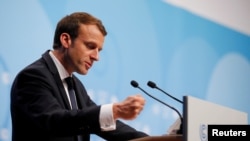Iran on Sunday criticized French President Emmanuel Macron over his tough stance toward Tehran and said Paris would soon lose its international credibility if it "blindly follows" U.S. President Donald Trump.
Tensions between Iran and France have risen in recent months after Macron said Tehran should be less aggressive in the Middle East, citing in particular its involvement in Syria's civil war.
Macron, unlike Trump, has reaffirmed his country's commitment to the deal Iran signed in 2015 with world powers under which it curbed its disputed nuclear program in exchange for the lifting of most international sanctions.
However, he has been critical of Iran's ballistic missile tests and wants to raise the possibility of new sanctions over the program, which Tehran calls solely defensive in nature.
"To sustain its international credibility, France should not blindly follow the Americans... The French president is now acting as Trump's lapdog," Ali Akbar Velayati, the top adviser to Iranian Supreme Leader Ayatollah Ali Khamenei, was quoted as saying by the semi-official Fars news agency.
Velayati also criticized U.S. Ambassador to the United Nations Nikki Haley, who last week presented pieces of what she said were parts of an Iranian missile supplied to the Tehran-aligned Houthi militia in Yemen. She described the objects as conclusive evidence that Tehran was violating U.N. resolutions.
"This claim shows she lacks basic scientific knowledge and decency. She is like her boss [Trump] as he also says baseless, ridiculous things. Iran has not supplied Yemen with any missile," Velayati said.
'Fingerprints'?
Tasnim news agency quoted the spokesman for Iran's elite Revolutionary Guards, Ramezan Sharif, as saying on Sunday that "they show a cylinder and say Iran's fingerprints are all over it, while everyone knows that Yemen acquired some missile capabilities from the Soviet Union and North Korea in the past."
France took a cautious stance on Haley's report. "The United Nations secretariat has not, at this stage, drawn any conclusions. France continues to examine the information at its disposal," Foreign Ministry deputy spokesman Alexandre Giorgini said on Friday.
Saudi Arabia, who has long accused Iran of smuggling missiles to the Houthis and has intervened against them in Yemen's war to try to restore its internationally recognized government, welcomed Haley's report.
Iran has one of the Middle East’s biggest missile programs and some of its precision-guided missiles have the range to strike its arch-regional enemy Israel.
Israel has also called for world powers to take punitive steps against Iran over its missile ambitions.
An Israeli cabinet minister said last month that Israel has had covert contacts with Saudi Arabia amid common concerns over Iran.
Velayati said on Sunday that reported meetings between Saudi and Israeli officials were no threat to Iran as both countries were "weak and insignificant."
Last month, the Revolutionary Guards warned Europe that if it threatens Tehran, the Guards will increase the range of missiles to above 2,000 kilometers (1,240 miles).










